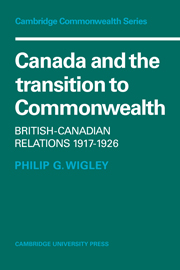Book contents
- Frontmatter
- Contents
- Abbreviations
- Preface
- Introduction
- 1 The threshold of responsibility, 1900–1916
- 2 New departures, 1917–1918
- 3 The settlement of peace, 1919
- 4 Unity and equality, 1919–1921
- 5 The centre cannot hold
- 6 Canadian diplomacy and Imperial diplomacy: 1923
- 7 From Lausanne to Locarno
- 8 The 1926 Imperial Conference: equality defined
- Conclusion
- Bibliography
- Index
4 - Unity and equality, 1919–1921
Published online by Cambridge University Press: 26 March 2010
- Frontmatter
- Contents
- Abbreviations
- Preface
- Introduction
- 1 The threshold of responsibility, 1900–1916
- 2 New departures, 1917–1918
- 3 The settlement of peace, 1919
- 4 Unity and equality, 1919–1921
- 5 The centre cannot hold
- 6 Canadian diplomacy and Imperial diplomacy: 1923
- 7 From Lausanne to Locarno
- 8 The 1926 Imperial Conference: equality defined
- Conclusion
- Bibliography
- Index
Summary
In the period that began with the departure of the overseas delegations from the Paris peace conference, British–dominion relations were marked by uncertainty and ambiguity – uncertainty because in spite of the striking record of co-operative endeavours of the previous few years, the pace and general direction of imperial affairs now lacked the clarifying stimulus of war; ambiguity because the dominions' rapidly advancing position within the imperial association, which was only just beginning to make its impact at the organizational level, had been overshadowed and possibly eclipsed by their new access to international affairs gained through the peace settlement. On the surface little was changed. At a time when dominion administrations were free again to return to their domestic concerns they were happy enough to leave wider imperial problems to the management of the British authorities, retaining a commitment in principle to an active role in the conduct of foreign affairs but in practice paying very selective and sporadic attention to these matters. With the Foreign Office therefore continuing to look after foreign policy on everyone's behalf the empire's diplomatic unity seemed unstrained. Yet while Britain and the dominions in this way maintained at least a passive form of imperial co-operation and mutual responsibilities, overseas governments were interested (if not actually under pressure) to consolidate and extend the status achieved at the Paris conference. The full implications of the new departure had still to be worked out, but soon enough the dominions were being spoken of as having attained a status of virtual equality with Britain – and there were few constraints upon them to prevent that equality being manifested at the expense of the empire's essential unity.
- Type
- Chapter
- Information
- Canada and the Transition to CommonwealthBritish-Canadian Relations 1917–1926, pp. 96 - 141Publisher: Cambridge University PressPrint publication year: 1977



